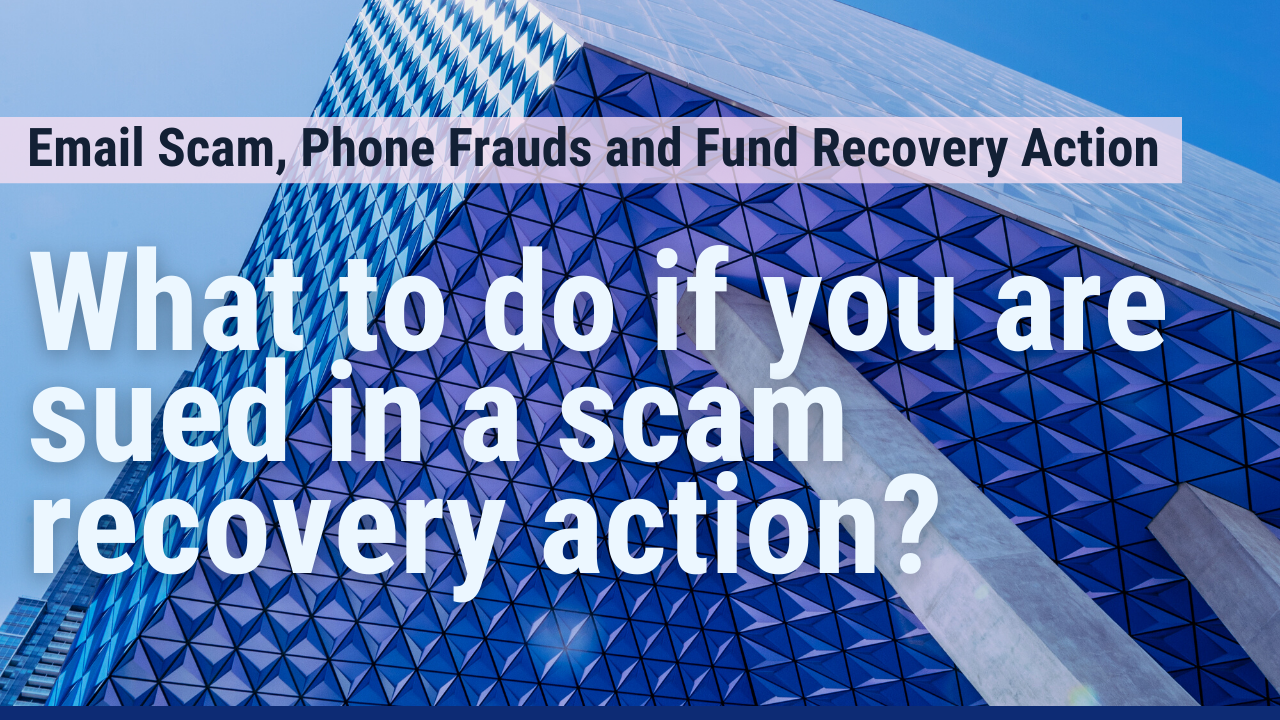In our November publication, we discussed the classic examples of email and phone scams and the recovery actions taken by the victims. Sometimes, the victims are not only those who were defrauded to pay the money, but those who might have no connection with the scam, yet are sued as a defendant in the scam recovery actions.
A. Innocent defendant?
Imagine a legitimate business appears to be financially sound and everything seems perfectly ordinary. On one typical working day, the company’s bank account was suddenly frozen out of the blue. The matter was further aggravated by receipt of multiple bundles of court documents with the company being named as one of the defendants. To add insult to injury, the director of the company was arrested by the Hong Kong Police for investigation on suspected money laundering.
Ludicrous as it may seem, it is what recently happened to many defendants in email/phone scam recovery actions brought by the victims, yet in most circumstances, these defendants might not be part of the scam and even did not know the plaintiff/victim. In these cases, it is usually revealed that among numerous ordinary daily transactions in the bank account for operation of the defendant company, there was a single transfer of money which was found originating from the victim of the email/phone scam perpetrated in the other end of the world. In most cases, the money in issue was received by the defendant company from its business partner or customer being payment of goods, settlement of invoices or bills or for other legitimate purposes via a paying agent, due to reasons such as foreign currency exchange control, shortage of US dollars or remittance limit in the payor’s bank accounts etc. It is also common for individual who received the money in issue as a result of engaging underground banking.
There may be legitimate reasons for the defendant to receive the money in issue. Yet, if the money in issue represents the traceable proceeds of the defrauded sum originating from a scam, the company or individual may be sued as a defendant in the victim’s recovery actions. The defendants are usually the second or third tier recipients of the traceable proceeds of the defrauded money. Once the victims reported scam to the Hong Kong Police, as mentioned in our November publication, the Police may issue a “no consent” letter which operates as an unofficial freezing order against the bank account(s) involved for suspected money laundering. In appropriate cases, urgent Mareva and Proprietary Injunction (“Injunction Order”) against the defendants may also be ordered in civil court. As a result, the defendants’ bank account(s) would be frozen pending the adjudication of the recovery action of the plaintiff. Injunction Order may paralyze the business or operation of a company as a going concern.
B. What should the defendant do?
Given the complexity of laws and procedures, the first thing a defendant should do is to consult a lawyer without delay. This is because the defendant needs a lawyer to deal with the Injunction Order and to defend the action. Thus, the longer the delay, the more prejudice will be caused to the defendant.
Dealing with Injunction Order
If an Injunction Order is granted on ex parte basis (without notice to the defendant), a return date will be fixed to be heard usually in 7 or 14 days thereafter so that the defendant will be given a chance to be heard and to make submission on his position. At the return date, the Court will deal with the following matters:-
- Whether the Injunction Order should be continued?
- Whether a disclosure order of bank statements and assets of the defendant should be made?
- Whether fortification of damages (to compensate the defendant if it is subsequently found that the Injunction Order should not have been granted) should be given by the plaintiff?
- Whether the defendant should be allowed to spend out of his assets for ordinary and proper business expenses as well as legal advice and representation expenses? If so, how much should be allowed?
Obviously, if the defendant is absent from the return date hearing, it is likely that the Court will make an order in favour of the plaintiff and hence the defendant’s interest may be prejudiced.
If the disclosure order of bank statements and assets of the defendant is made, the defendant will be ordered to file and serve an affirmation to disclose the same within a prescribed period of time. Non-compliance of the Order by the defendant may result in contempt of Court.
Thus, if the defendant has a valid defence, he should appear or instruct lawyer to appear on his behalf at the return date hearing to:-
- Oppose the Injunction Order;
- Oppose or limit the scope of disclosure order and seek more time to file and serve the affirmation (for disclosure of assets) to avoid being cited for contempt of Court;
- To seek allowance to spend out of his assets or funds in the frozen bank account(s) for ordinary and proper business expenses as well as legal advice and representation expenses;
- Seek fortification of damages against the plaintiff such that the defendant will be compensated if it is subsequently found that the Injunction Order should not have been granted.
Defending the Action
In recovery actions of plaintiff, the usual causes of action against the defendant(s) are:
- defendant was unjustly enriched at the expenses of the plaintiff by receiving the money belonging to the plaintiff;
- by receiving the money which belongs to the plaintiff, the defendant is a trustee de son tort and hold the money on trust for and on behalf of plaintiff;
- knowing receipt of the money as proceeds of crime and/or dishonest assistance to the fraudster by channeling the money away from the plaintiff.
If a defendant does not enter into appearance of the proceedings, adverse inference may be drawn against him that he may be part of the scam. Upon expiration of the prescribed time, if the defendant still fails to file his notice of intention to contest or a defence, default judgment will be entered against the defendant. The plaintiff may then enforce the final judgment against the funds in the bank account(s) of the defendant by Garnishee Order to recover the defrauded money.
The common defence of the second or third tier recipient of the traceable proceeds of the defrauded money is that the defendant is (i) a Bona fide purchaser of value without notice of the scam and (ii) his position has been changed in good faith as a result of the justifiable reason and the circumstances under which the money was received.
To substantiate the defence, the defendant has to prove that it has a legitimate reason to receive the money in issue, for instance, the money is for genuine payment of goods sold or consideration of commercial contract or settlement of invoices or bills etc, without knowing or noticing that they are fruits of crime. In other words, the defendant is a bona fide purchaser for value without notice of the crime.
To establish the “change of position” defence, the defendant has to prove that it will be inequitable in all the circumstances to make restitution of the funds to the plaintiff. The gist is that the defendant MUST ACT IN GOOD FAITH.
Amongst the second or third tier recipient of money, a number of them are sued because of engaging in underground banking system to exchange foreign currency and the money was later found originating from the scam. Underground banking is a financial network that operates outside of legal banking channels to transfer money out of the jurisdiction to circumvent regulations or foreign currency control therein. Recently, it has been argued that such transaction would be rendered void and enforceable and that the defence of bona fide purchaser of value without notice may be tainted by illegality.
C. Our Tips
With the prevalence of scam across the globe, it is not uncommon for a company or an individual to fall into the trap quite innocently. Here are some takeaway tips to better protect your interest:-
- Consult a lawyer once you are sued or received legal documents
- Do not accept funds from unknown source(s)
- Inquire the source of funds of your business partner
- Avoid underground banking or similar activities
- Ensure that all transactions are properly documented





